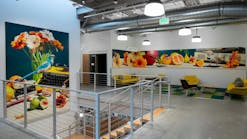Peter van Strijp, executive VP and CEO of Philips' Solid-State Lighting business unit, said that today's installed luminaire base will continue to drive conventional lamp replacement, but that luminaire sales will convert gradually to solid-state. "Solid-state creates new lighting possibilities with more initial points per application," he said.
In turn, this requires the development of "intelligent lighting modules" to control the quality of light and color mixing, which are dynamic over time and can store preferred settings in memory while providing an easy and intuitive user interface.Philips Solid-State Lighting business is able to leverage the technical capabilities of a number of other Philips Electronics units; Philips Research for advanced technology development, Philips Semiconductors for packaging of modules & systems; Philips Design for intuitive user interfaces; and Philips Software Development for control intelligence.
Philips recently announced a partnership with its part-owned subsidiary Lumileds to develop new modular LED lighting products for the automotive industry (see Philips teams with Lumileds to target automotive applications). "In the automotive industry, we're a leader, equipping four out of every ten new cars worldwide with lamps, and we aim to build on these leadership positions," said Theo van Deursen, president and CEO of Philips Lighting.
The meeting also marked another milestone for the division's LED business. "Today we're launching a four-year partnership with Saks Fifth Avenue stores in the United States. This will see our state-of-the-art LEDs light up Saks' flagship storefront in New York during the holiday season," said van Deursen (see LED snowflakes descend on New York City).







